
Home
Preamble
Index
Areas
Map
References
Me
Drakkar
Saunterings: Walking in North-West England
Saunterings is a set of reflections based upon walks around the counties of Cumbria, Lancashire and
North Yorkshire in North-West England
(as defined in the Preamble).
Here is a list of all Saunterings so far.
If you'd like to give a comment, correction or update (all are very welcome) or to
be notified by email when a new item is posted - please send an email to johnselfdrakkar@gmail.com.
193. Reflections on Three Walks, Remembering Nicola Bulley
 I had hoped that by now I would have regained some of the walking fitness that had lapsed in recent weeks
but I have been thwarted. I slipped on ice and hurt my back. So I am not contemplating long
walks at the moment.
Meanwhile here are some thoughts on three previous walks, two by me.
I had hoped that by now I would have regained some of the walking fitness that had lapsed in recent weeks
but I have been thwarted. I slipped on ice and hurt my back. So I am not contemplating long
walks at the moment.
Meanwhile here are some thoughts on three previous walks, two by me.
On this day last year (January 27th 2023), on a cold, but not frosty, and cloudy, but not rainy, morning I
walked along the Ribble Way in Preston (Sauntering 171).
At the exact same time, ten miles away, Nicola Bulley
was walking along the Wyre Way in St Michael's. Ms Bulley vanished. Later an inquest determined that
she had accidentally fallen in the River Wyre, had died virtually instantly from the cold
shock, and had immediately floated down-river, with her body being found 23 days later
a mile away.
I followed this investigation from the beginning because, having taken a similar walk on the
same day (provoking the thought that such an accident could equally well have
happened to me) and having also walked along the Wyre Way through St Michael's on a previous
outing (Sauntering 103),
I could picture the scene of these events and sense the implausibility of the police narrative.
But then, when a person vanishes any proposed explanation will seem implausible.
In the early
days of the case I remarked to Ruth that I didn’t believe that Lancashire Police were as incompetent as it
appeared – but that they were prepared to appear incompetent. Why? I had no idea but presumed
that they considered something else more important than what they wanted us to consider a
straightforward missing person enquiry, turning into a case of accidental drowning.
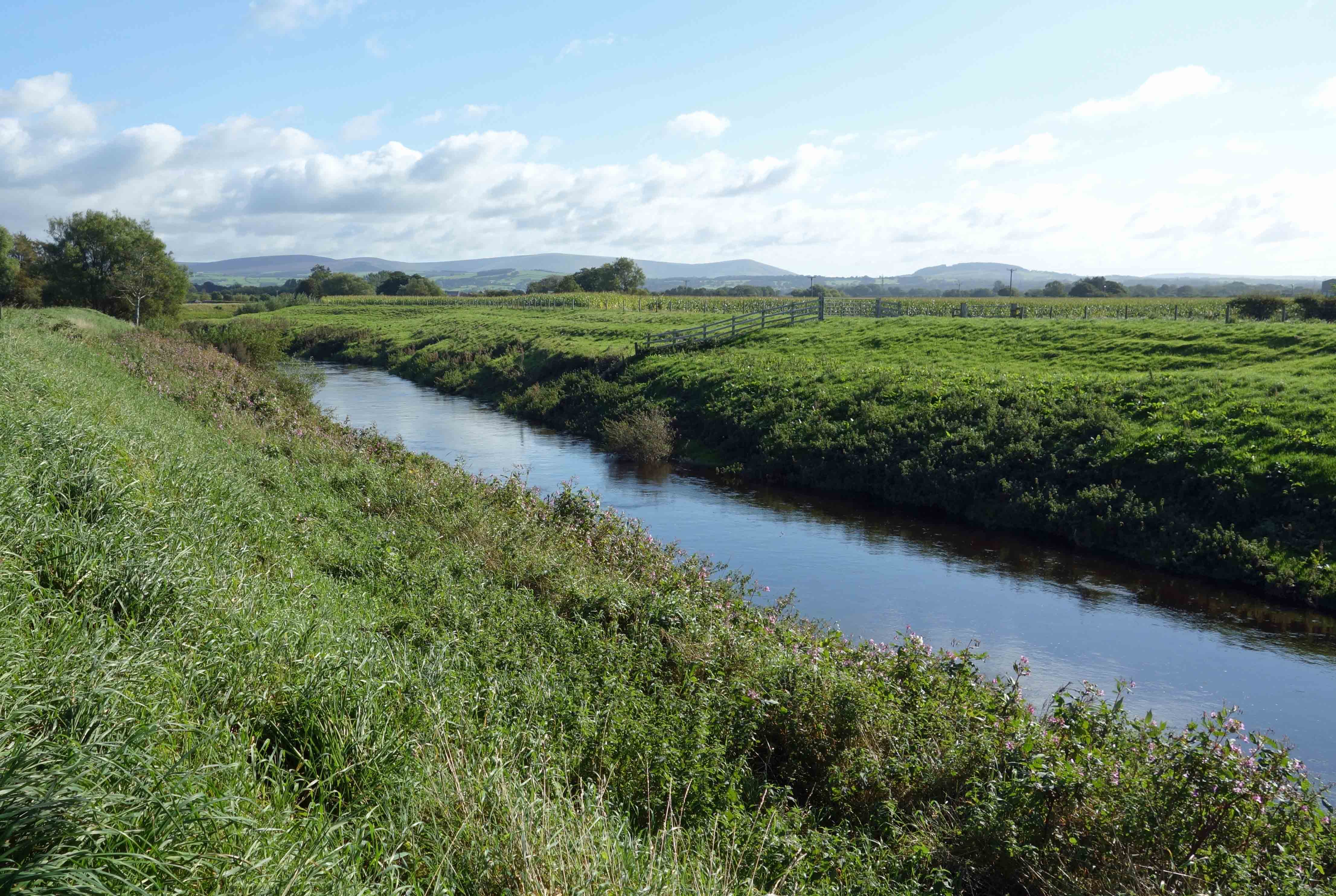
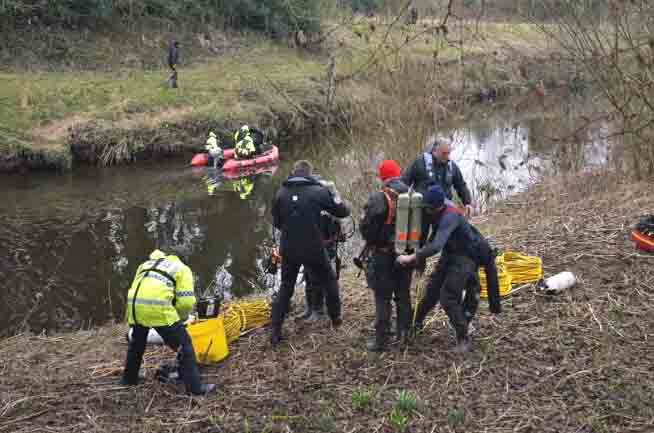
Left: The River Wyre upstream of St Michael's; Right:
Search teams at the 'accident spot'.
As can be seen, the Wyre is a modest river. On the occasion of the left photo
(Sauntering 103 in September 2020) the water
was hardly flowing.
It is about six metres above sea level here with fifteen miles or so to flow to reach
the sea - so, as I said in Sauntering 103, it is obviously a
sedate journey from here.
At the inquest, the police stated that there was a considerable flow (1 metre per second)
at the point Ms Bulley was said to have fallen in. Videos of the day show this not to have been the case.
It had been exceptionally dry in the previous weeks.
The 'accident spot' is above a weir, which makes
the river above it somewhat like a mill-pond. Anyway, experts tell us that bodies sink to the river-bed and
don't usually move far (and then rise to the surface after a week or more).
It seemed unlikely that Ms Bulley's body would have immediately floated away,
somehow crossed the weir, and disappeared down-river, all without being seen.
It was a cold, dull January day. I kept on the move on my walk. It wasn't a day to stand around
or sit on a bench, as Ms Bulley was assumed to have done.
Those were my immediate thoughts, anyway, based on my experience of the day and what I remembered of the River Wyre.
I will resist the temptation to analyse the many oddities, inconsistencies and coincidences of
this case. It would take a book-length document to do so. Instead, I will mention two broader
'meta-issues' that transcend the Ms Bulley case.
First, anyone who followed the Ms Bulley case closely will be bound to have lost respect for
our policing system. Perhaps I was naďve to have the respect that I did, after Hillsborough, the
Birmingham Six, Sarah Everard and so on. I was naďve also in thinking that an inquest is an inquiry –
it is really a ritual to confirm the police's view (there were no contradictions or questions
at Ms Bulley's inquest). It was disillusioning to realise
that it had been decreed that this was a nothing-to-see-here case of drowning and that
everyone involved in the investigation was committed to that narrative.
(The initial narrative suggested suicide but, as that became increasingly untenable, it became an
accident.) We were
repeatedly told that there was no evidence of third-party involvement. That could have been
because everyone turned a blind eye to any hint of such evidence.
For just one example from many: at a press conference the Senior Investigating Officer said, with respect
to ‘suspicious fishermen’ reported by witnesses, that “I myself don’t find it suspicious
that fishermen would be in the area of a river … but I’m really keen to trace them to make
sure there is no further information that they can give us”. That is not an investigative
frame of mind. This 'keenness' never manifested itself. The ‘fishermen’ were, of course, never traced.
Unfortunately, there seem to be many examples of institutions
(the Post Office, hospitals, the police, the armed services, the media, …) becoming
committed to a narrative, often one that does not damage its reputation, and seeking no
evidence to refute it. You cannot prove a hypothesis by seeking only evidence that supports it.
You need to seek evidence that falsifies the hypothesis. If you don’t find it all well
and good for your hypothesis. If you do then you must try to modify the hypothesis into
a better one. However, that assumes that you would prefer a better hypothesis when,
in fact, you may be determined to retain your original one, regardless.
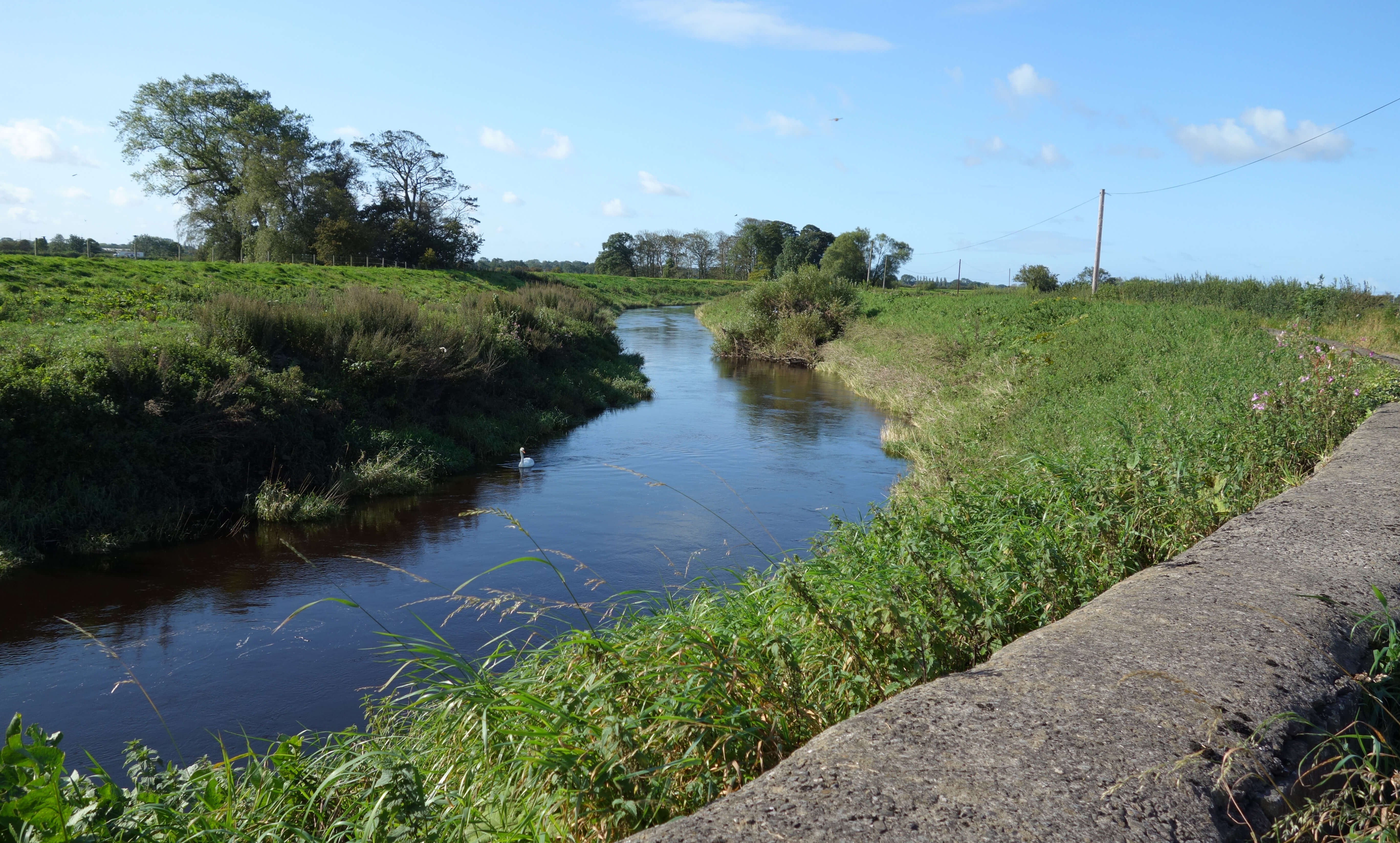
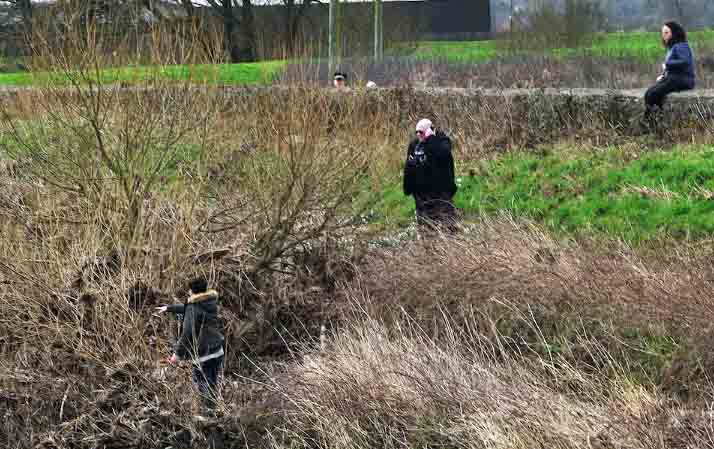
Left: The River Wyre downstream of St Michael's; Right:
The 'body finder' pointing out the location of the body.
The left photo was taken on the Sauntering 103 outing
before, of course, I knew the significance
of this spot. It was here that, according to the inquest, Ms Bulley's body was found, about
one mile downstream from St Michael's, in the tidal part of the river.
The footpath from St Michael's continues on a grassy embankment until it meets a road.
To continue west you have to walk on the road, with a wall between you and the river.
As I remarked in Sauntering 103 once you leave the embankment
to walk along the road you can hardly see the river (note the policeman's head just
above the wall in the right photo).
As the left photo (which was taken after I'd clambered up beside the wall) indicates,
it is hard to see the bottom of the near-side bank, where
a witness (not a local but a 'spiritualist medium' summoned from afar) claimed to have spotted the body.
As many speculators soon noted, here,
with a lay-by next to the river, would be the best place if
you wished to tip a body into the river.
To end this speculation, the witness clarified a week later that he hadn't spotted the
body entangled in the willow shrub but had first seen it floating in the river and had
walked alongside it for a few minutes before it became entangled. However, at that time
the tide would have been bringing any body upstream – that is, towards us in the left photo – where
there is no footpath to walk alongside.
A distressing video showing the retrieval of the body –
yanked up on ropes like an old mattress – led some to speculate that it wasn't a body at all.
Surely the police wouldn't treat a body with such disrespect.
Later an experienced independent search team, asked to help by Ms Bulley's family and friends,
said that they had found a body
twelve days earlier, above the weir! Since this team weren't following the narrative,
they were thoroughly discredited by the police.
So even my brief encounter with
the river here led me to doubt the official narrative. Others found many other things to doubt.
The second meta-issue concerns the police’s insistence that their work was being hampered
by tik-tok ghouls and armchair detectives. They urged the public not to speculate.
The commissioner, who is supposed to hold the police to account on behalf of the public,
lamented that the police had ‘lost the narrative’ when ‘they were right all along’.
However, the police cannot expect or demand that the public refrain from speculation,
especially during such a strange investigation (or lack of it) as this. The accidental death narrative is
itself speculation, since there is no direct evidence to support it.
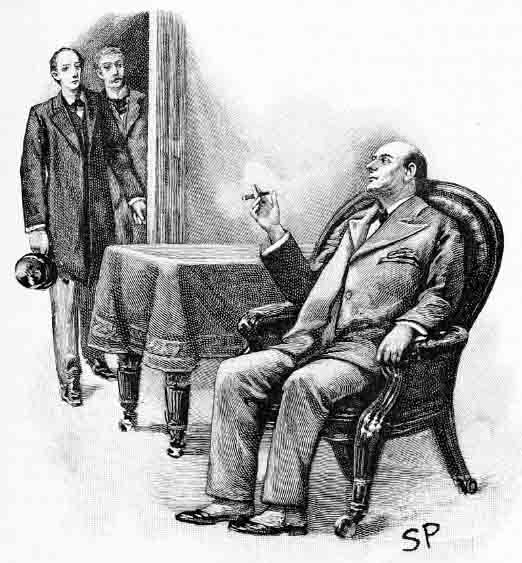 Right: An armchair detective: Mycroft Holmes instructing his brother Sherlock from an armchair,
in the 1893 story of 'The Greek Interpreter' in which Sherlock says of his brother, "If the art of the
detective began and ended in reasoning from an armchair, my brother would be the greatest
criminal agent that ever lived".
Right: An armchair detective: Mycroft Holmes instructing his brother Sherlock from an armchair,
in the 1893 story of 'The Greek Interpreter' in which Sherlock says of his brother, "If the art of the
detective began and ended in reasoning from an armchair, my brother would be the greatest
criminal agent that ever lived".
In general, and even in a perfect investigation, speculation should be welcomed not
suppressed. It is natural to speculate. We progress through speculation.
Among the thousands of on-line speculators there are bound to be some
‘amateurs’ who have more
expertise in particular aspects than the police can hope to have. For example, only a fitbit expert can say
whether it is possible for Ms Bulley’s fitbit to continue to record a heartbeat for some time
after she has died, as the police professed to believe.
Of course, members of the public should not interfere by travelling to the location in numbers
and searching residents' gardens, say,
but the police have forfeited whatever right they had to dissuade us
from commenting and speculating. Now it seems part
of an increasingly futile endeavour by authorities to coerce us to just accept what they
tell us. Such a restriction cannot be enforced today, now that everybody has a
platform to express a view.
This does not mean that all views should be considered equally valid and deserve an equal platform.
Since it is not possible, outside formal systems like mathematics, to prove a view (or hypothesis)
it is a matter of judging the reasoning behind that view.
Unfortunately, those in a position to investigate this case properly are also those with a
vested interest in not doing so. Coincidentally, the three leading police investigators on this case
are no longer with the police force.
I doubt that there will be a denouement. The Ms Bulley
case is not an episode of Death in Paradise.
Date: January 27th 2024
Home
Preamble
Index
Areas
Map
References
Me
Drakkar
© John Self, Drakkar Press, 2018-

Top photo: The western Howgills from Dillicar;
Bottom photo: Blencathra from Great Mell Fell


 I had hoped that by now I would have regained some of the walking fitness that had lapsed in recent weeks
but I have been thwarted. I slipped on ice and hurt my back. So I am not contemplating long
walks at the moment.
Meanwhile here are some thoughts on three previous walks, two by me.
I had hoped that by now I would have regained some of the walking fitness that had lapsed in recent weeks
but I have been thwarted. I slipped on ice and hurt my back. So I am not contemplating long
walks at the moment.
Meanwhile here are some thoughts on three previous walks, two by me.




 Right: An armchair detective: Mycroft Holmes instructing his brother Sherlock from an armchair,
in the 1893 story of 'The Greek Interpreter' in which Sherlock says of his brother, "If the art of the
detective began and ended in reasoning from an armchair, my brother would be the greatest
criminal agent that ever lived".
Right: An armchair detective: Mycroft Holmes instructing his brother Sherlock from an armchair,
in the 1893 story of 'The Greek Interpreter' in which Sherlock says of his brother, "If the art of the
detective began and ended in reasoning from an armchair, my brother would be the greatest
criminal agent that ever lived".
